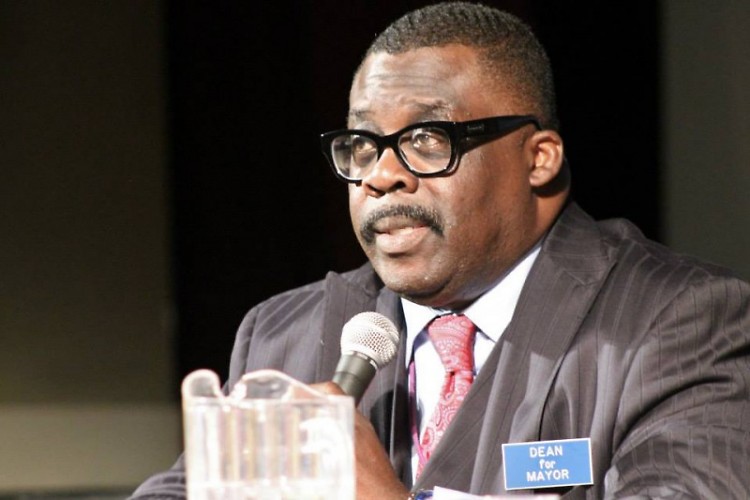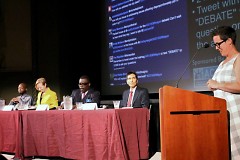For our last set of citizen questions answered by the mayoral candidates, we’re addressing questions of social ills and issues: housing and gentrification, race, police relations and welcoming LGBTQ residents. All questions were collected at the debate held at the Wealthy Theatre on July 15.
Rosalynn Bliss, City Commissioner, says that affordable housing is a critical issue for residents, and that city government working with community partners is key in being able to respond to housing issues.
“As improvements are made that make regions of our city more appealing, current residents cannot be priced-out of the housing they have resided in. This is accomplished both through policy and through working with those interested in development so that substantial affordable housing is a part of their plan from the start,” says Bliss. “We are actively working on examining tools that we can utilize to increase affordable housing options in every neighborhood. Longer term, potentially growing the number of affordable housing units required within a particular geographic area is important to consider.”
Robert Dean, pastor of New Life Church of God in Christ and former City Commissioner and State Representative, says he sees the city continuing to become more racially and ethnically diverse.
“Grand Rapids’ population is highly mobile and increasingly diverse,” he says. “and could change rapidly without displacement."
John George, retired engineer, says he supports affordable housing for all.
“But I believe the free market should be responsible for this issue,” he says. “I support all federal anti-discrimination laws, including those that deal with housing. There are federal programs that address housing. The Feds seem to have an endless pot of money, and while our current city officials seem to think the same thing, they are incorrect.”
When addressing housing issues that result in homelessness in our young residents, Dean believes that the Grand Rapids Public School is a key.
“The city of Grand Rapids must work with the schools to make sure the young people are educated so that they can best utilize their skills. Education can provide a set of broad based skills that are very important to success in our present world and should include skills for collegiate programs but also for careers in all workplaces,” he says. “It has been and always will be true: ‘give a man a fish and you feed him for a day; teach a man to fish and you feed him for a lifetime.”
George says in areas of homelessness, he’ll defer to Willard Lee’s expertise in the area. Lee, who entered the race to address the problem of homelessness in our veteran population and is a veteran himself, was unable to be reached for comment.
When addressing questions of race, and addressing issues that affect people of color in Grand Rapids disproportionately, Dean refers back to the City’s debt.
“When we address the cities [sic] major debt issues we can help make it more affordable to own a home and we help make it easier to open a business and start a company,” says Dean.
Bliss says that there are many facets to addressing the inequalities faced by people of color.
“Many organizations - from the Urban League to LINC to many churches in our city - work hard every day to make a difference from within. Greater education for individuals who do not experience bias is vital; the Institute for Healing Racism, Partners for a Racism Free Community and individuals who participate in the Racial Equity Network are working to educate the broader community,” says Bliss. “Progress requires both: support for those facing inequities and education for those who do not face the same realities every day.”
When asked about community policing, Dean says we are “currently on the right track.”
“But they are very under staffed and they need to continue their out reach and to be more visible at events and local gatherings,” he says. He continues on the militarization of police, “Our world since the September 11 has changed dramatically and has become a far more dangerous place. We must be prepared to protect our citizens from external forces but at the same time preserve the individual’s rights…A professional public safety organization needs to have all form of arms and equipment to protect the community. It is not good public policy to place our public safety officers in harms way with out proper equipment and training.”
All three of the candidates who responded to citizen questions were in favor of body cams.
All three were also in support of Grand Rapids becoming LGBT friendly, though their answers to this citizen question varied significantly.
“It's important for each candidate to treat each citizen equally as prescribed by the Constitution, period,” says George.
Dean also brought government language to the conversation, with a reference to the Gettysburg Address.
“We are a government of the people for the people and by the people to serve all people,” he says.
Bliss says she has been an advocate for LGBTQ issues her entire public life.
“I have been a strong supporter - both financially and personally - of the Grand Rapids Community Foundation's LGBT Fund, which works to provide a welcoming atmosphere in West Michigan for the LGBTQ population. I am proud of the work our Community Relations Commission has done in regards to addressing discrimination,” she says. “I have been thrilled by the changing societal support that has occurred in the past few years, both nationally and locally, and I will continue to be a champion for making Grand Rapids an attractive place for everyone.”
Willard Lee was not able to be reached for comment.
The Rapidian, a program of the 501(c)3 nonprofit Community Media Center, relies on the community’s support to help cover the cost of training reporters and publishing content.
We need your help.
If each of our readers and content creators who values this community platform help support its creation and maintenance, The Rapidian can continue to educate and facilitate a conversation around issues for years to come.
Please support The Rapidian and make a contribution today.

